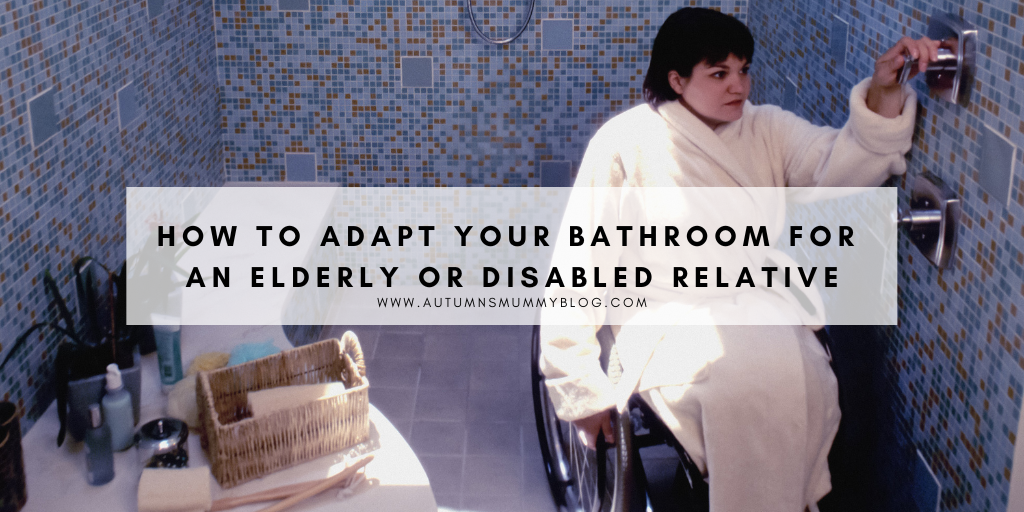Collaborative Post¦ The bathroom. A place where we can truly relax and unwind. Whether you love having a soak under the bubbles or a quick and easy shower, many of us take for granted how easy it is to use these fixtures. If you have an elderly or disabled guest coming over, you may need to make certain adaptions to your bathroom.
Try and see things from their viewpoint. Something as simple as getting off the toilet may be straightforward for us, but your loved one may have great difficulty. You will want your guest to have a pleasant experience at your house, so for that to happen, here are some changes you can make to your bathroom that will be elderly and disabled-friendly.
Fit a Grab Rail
Common home modifications for disabled people include grab rails. A grab rail is a simple and effective fixture that can provide added assurance for an elderly or disabled relative. Adding a rail to your bathroom wall adjacent to the bath will help them get in and out. You may prefer to have one next to the shower. For easing themselves onto the toilet, you may need to purchase a larger grab rail. A perfect solution may be a fold-up grab rail which can easily be taken off when not in use.
You could go one step further and consider replacing your current toilet with one that is a more comfortable height one instead. This features a slightly higher seat. Your relative may find it easier sitting and getting back up from this kind of toilet.
Buy a Shower Seat
If your loved one has mobility issues, they may struggle to stand up in a shower for long periods. Therefore, why not consider buying a shower seat to take the weight off their feet? There are several options you can pick. If you are having a guest over for a number of nights, a freestanding shower seat may be the solution. Although, if you’ve got a guest staying for an extended period, it could be worth installing a fold-down seat.
The great thing about shower seats is there are an array of stylish designs to pick from. All of which are sure to complement your bathroom décor. You can purchase a shower commode chair from Adapt a Home. They are specialists when it comes to mobility aids and disability equipment. Toileting aids like a shower commode chair can help your relatives to maintain their independence and dignity.
Purchase High Contrast Taps
For an elderly or disabled relative that is partially sighted, it will definitely help if your shower and taps are high in contrast when compared to the rest of your bathroom décor. For instance, if your walls and basin are white, why not consider switching chrome taps with black ones instead? You can do this with showers too.
High contrast taps enable your guests to locate them much easier. Making the switch will lower the risk of a slip and fall in the bathroom. Also, consider installing sensor taps. They’re easy to operate and designed for access and mobility.
Pay Attention to Lighting
If your loved one has poor vision, it’s vital you pay attention to the lighting of your bathroom. You may benefit from installing motion sensor lighting. This can be a blessing, especially during the night or when there’s minimal light coming into the bathroom from a window. The major plus of motion-activated lights is you do not need to worry about trying to find a light switch in the dark.
Many older people go to the toilet during the night. Therefore, it’s essential you make sure the hallway leading to the bathroom is well lit. This is because any potential trip hazards will be clearly visible. For those conscious of the environment, you may want to look into LED lighting. They have a longer lifespan when compared to traditional bulbs and use less energy.
Install Non-Slip Flooring
To ramp up bathroom safety for your elderly or disabled relative, investing in slip-resistant flooring is a must. This is especially important if you’ve got a level access shower. You should also consider buying high-quality anti-slip mats.
Should you have a poor-quality mat on the bathroom floor, not only may it not be secured properly, but there’s also a greater risk of a loved one falling. It’s advised to stick with thick rubber mats. They have excellent traction, especially if it’s got a dotted or ribbed surface. Thicker mats aren’t as likely to have their corners turn up either, which is a common trip hazard. As you would expect in a bathroom, water gets on the floor. To prevent you or a loved one from getting injured, non-slip flooring is the way forward.
Whoever uses the bathroom, making minor adjustments will ensure it caters to everyone. From where you put the light switch, to the types of taps you buy, there are numerous ways you can adapt your bathroom so elderly and disabled guests can enjoy the fixtures safely.
Disclosure: This is a collaborative post.
